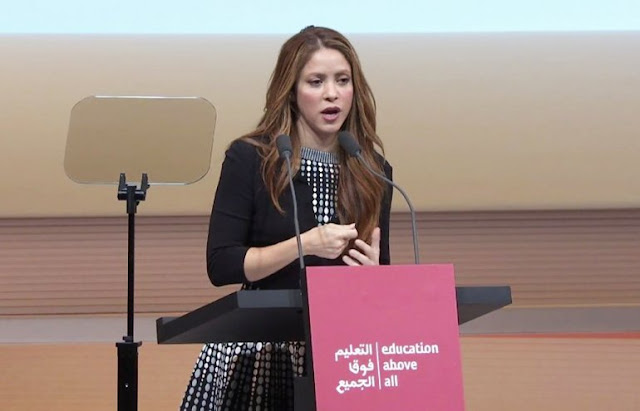Apprendre l'Anglais avec Shakira: Dicours de la star en vidéo, audio, texte
 |
| shakira |
Cliquez sur le boutton ci-dessous et patientez un peu pour lire le son vous pouvez parcourir le texte en même temps.Bonne écoute!
Good morning Your Highness, excellences, friends, and colleagues. I would like to thank you for the
opportunity to be here today. It's also an honor to join forces with Educated Child, an organization led by a woman who is an amazing role model — a woman who has shown such relentless dedication to getting
every child in school.
This is such an exciting day for us because it marks the beginning of a new era in my home country
Colombia. Most of you may know me as an artist, as an entertainer, and that's indeed my calling and what
I've been doing since I was 13 years old, but I never would have imagined when I started out that my work as an artist would end up being the vehicle for me to serve my greater purpose in life of working towards eradicating poverty through the power of Education.
As a Colombian citizen inequality as a concept that sadly one becomes very familiar with at a very young age. It's a country like many others in Latin America where a few have a lot; a lot have almost nothing and
where if you're born poor, you will almost certainly die poor. Where people don't access equal
opportunities, and because of that generation after generation, after generation live trapped in the same
vicious cycle fed by prejudice and inaction.
Growing up in my country when I was around eight years old, I remember I saw kids my age who, instead of being in school were already working in the streets, were barefoot in the park. Kids like me whose reality was completely different than mine only because of the circumstances into which they were born.
It was really hard for me to accept that to accept that something so unjust didn't have a solution. There had to be something that could be done. So I often asked myself why the adults, around me were so resigned to
the fact that these kids who were just like me or even their own children we're living in a parallel reality so different and so cruel. As Kofi Annan put it, poverty is intolerable in a world of plenty, so as soon as I had some success, the first thing I wanted to do was to invest as many resources I could into what later would
become the most meaningful project of my life, working for children. So I set out to find a team, a team of people who dream big and worked hard and thought like me to help me right the wrongs that I had
witnessed throughout my entire childhood, and that's when our foundation The Barefoot Foundation, ‘Pies
Descalzos Fundacion’ was born.
I knew, and I was only 18 years old then, but I knew that I wanted to focus on children and improving their
lives, but I didn't know where to start. So, I really felt that I needed to learn what the roots of inequality andlow social mobility were. So, I decided to study the reasons why children were working in the streets or why
some children were being recruited by the violent organizations, like the paramilitary or the guerrillas, why were so many children suffering from chronic malnutrition and I realized that most of the issues that
children face in my country had and have a common denominator; the lack of access to quality education.
To me, it became crystal clear that Education was a surest way to give all these kids the best fighting chance
of improving their circumstances in life because Education is the great equalizer. When I started building schools in Colombia, which shows the most remote areas, areas where there was literally nothing, no
infrastructure, no paved roads, no electricity, no potable water, and we decided to build in those places but not only build schools but state-of-the-art schools. Schools with comprehensive models that included ECD
programs, school feeding programs, parent and teacher training, and another very important part is we've decided to engage the government as a strategic partner and made it nearly impossible for them to say no
to doing their part by showing them results through our holistic model that really proved to work.
We noticed that as soon as a school is built in those places, everything is transformed. The improvements to
the infrastructure were jaw-dropping electricity, and potable water were made available, made accessible.
Roads were paved, malnutrition plummeted, but the best part of all is the academic results, the kids really
responded academically, and now those kids who could have been recruited by the guerrillas or
paramilitaries or that could have had a completely different outcomes for their lives, they're now on their
way to the University and thriving in their communities. Some of them are athletes; some of them are
professionals.
That's why… I'm so…It really is a thrill to work for Education that's why I'm so passionate about it because I've really seen results that are as palpable as this podium and seeing all these success stories that have a
name and a last name has been the one of the most rewarding things I've done in my lifetime even more so than winning Grammys, I think.
Now that said, our work is far from being done, many developing countries are still rife with inequality and internal conflict, and there are a lot of kids who still need to be reached.
History is not only the past. History it's made every day in the present, and what matters now is how we go
forward and how we'll fix what's wrong, and that is the real challenge. This is the goal of the SDGs and what
people like Her Highness and myself, and so many more of you who are adamant about achieving are here
for. Facts don't lie, and numbers show what an incredible return on investment a quality education provides. For
instance, if all students in low-income countries left primary school with basic reading skills, a hundred and
seventy-one million people could be lifted out of poverty. Systemic change often begins from the bottom up
rather than the top down. The government must take responsibility, and we should all put as much pressure
as we possibly can, but the rest of all the civil society should also do their part
What we have discovered both here IPS discuss and educated child is that many times only one single
barrier to entry, such as no access to transportation or basic needs like a functioning bathroom, can prevent
a kid from attending school or even put them at risk of dropping out. Sometimes all it takes to change a child's life is the security of a hot meal in school or the ease of being able to hop on a bus that will leave you safely at your classroom door, it's as simple as that, and these are simple interventions, and they don't cost a lot.
The biggest effort really is in mapping the communities; in going door-to-door searching for the out of
school children talking to the parents talking to their families, giving a name and putting a story behind
these children is the first step to start rewriting their story.
Over the next three years, we pledge to get fifty-four thousand kids who are out of school or at risk of drop out into the educational system. Ultimately, more than two hundred ninety-five thousand people will benefit from this project, including children, teachers, families, and community members. New schools and classrooms will be built, school kits and uniforms will be distributed; children will be enrolled in school,
feeding, and transportation programs. Teachers will be trained in strategies and how to identify those
students who are at risk so they can receive psycho-social support, and we are extremely confident that this partnership is only the beginning and will be the model to replicate throughout my country until not a single child is out of school.
This is our responsibility...Thank you...This is our responsibility to our children and our debt to fulfill for the
generations to come.
Thank you very much
Dites ce que vous en pensez en commentaires!










Commentaires